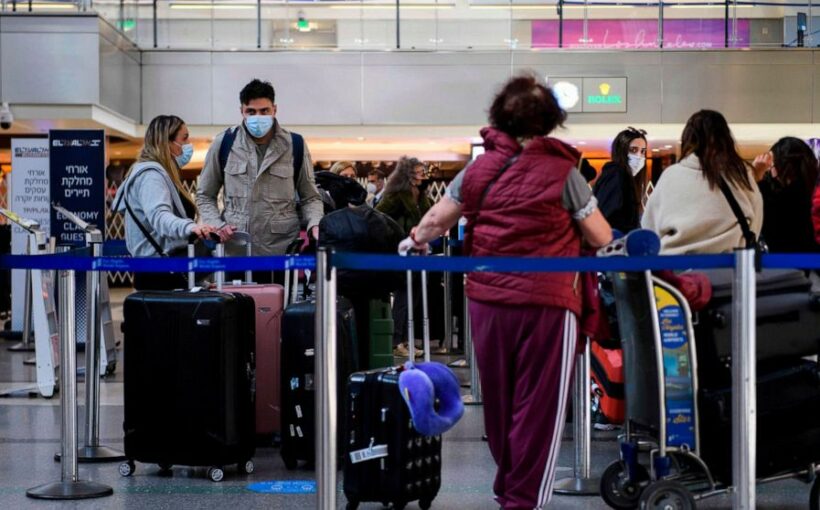Centers for Disease Control and Prevention Director Dr. Rochelle Walensky on Monday defended her agency’s decision not to endorse travel for vaccinated Americans, saying that, even as the CDC says they can socially gather without masks, increasing travel would add to the number of COVID-19 cases and pose a risk to the majority of the country not yet vaccinated.
Walensky said the agency’s guidance has not changed, saying that travel has increased COVID-19 cases and that, even though people who are vaccinated are less likely to become seriously ill, CDC doesn’t have enough data yet to know if they can transmit the virus to others.
“In terms of travel, here’s what we know: Every time that there’s a surge in travel, we have a surge in cases in this country. We know that many of our variants have emerged from international places, and we know that the travel corridor is a place where people are mixing a lot,” she said.
“We are really trying to restrain travel at this current period of time, and we’re hopeful that our next set of guidance will have more science around what vaccinated people can do, perhaps travel being among them.”
CDC’s guidance on travel, last updated in mid-February, says to avoid non-essential travel because it increases the risk of contracting and spreading COVID-19. Masks are required on most forms of interstate transportation as well as big transportation hubs like airports and train stations. If people plan to travel they should get vaccinated if possible, get tested before and after the trip, wear a well fitting mask, and maintain distance from others when possible, the guidance says.
Some states also require travelers to quarantine when they return to the state if they visited an area with a high number of COVID-19 cases.
Public health officials attributed the intense surge in cases in January to the increased travel over the winter holidays and even as those numbers have declined officials like Walensky and Dr. Anthony Fauci say they are still too high for the country to relax.
Biden administration officials say there will be enough supply of vaccines for everyone in the country by the end of May and that we could resume more activities like socializing and eating at restaurants this summer if the majority of Americans get vaccinated, but until then its important to keep the number of COVID-19 cases down.
Public health experts, including Dr. Ashish Jha, dean of the Brown University School of Public Health, say it’s even more important to avoid scenes like last year’s spring break crowds when the country is so close to getting everyone the vaccine.
“Given how close we are to the finish line anybody who gets infected today and dies in three or four weeks is somebody who would have gotten vaccinated a month from now,” he told ABC News.
The CDC said Monday that people who are fully vaccinated — meaning at least two weeks after receiving all necessary doses the vaccine — can gather with other vaccinated individuals in small groups without wearing masks or social distancing. Fully vaccinated individuals can also spend time with people who aren’t vaccinated as long as they are at low risk for disease and keep it to small groups and wear masks if the people who aren’t vaccinated are from multiple households.
But any of those gatherings, like grandparents visiting unvaccinated grandkids, are limited by location, Walensky said, because the CDC still wants people to refrain from traveling.
“We would like to give the opportunity for vaccinated grandparents to visit their children and grandchildren who are healthy and who are local, but our travel guidance currently has been unchanged,” she said.
Walensky said that because the vast majority of the population still isn’t vaccinated, the CDC needs to prioritize keeping those people safe, especially if people who are vaccinated can still transmit the virus. According to CDC data, 12% of adults have received two doses of the vaccines, but 9.2% of the total population, including those under 18.
“I think it’s important to realize, as we’re — as we’re working through this, that still over 90% of the population has not yet been vaccinated, and that it’s our responsibility to make sure, in the context of 60,000 new cases a day, that we protect those who remain unvaccinated and remain vulnerable,” she said.
White House Senior COVID-19 Adviser Andy Slavitt said the administration does believe that being able to travel is motivating some people to get vaccinated and that they hope to increase the list of what vaccinated Americans are able to do, but that CDC will only do that when the data supports that it is safe.
Walensky said the CDC will update the guidance on what vaccinated individuals can do safely as more people get the vaccines but until then the focus should be on protecting people who aren’t vaccinated from contracting the virus.
“The recommendations issued today are just a first step. As more people get vaccinated and the science and evidence expands, and as the disease dynamics of this country change, we will continue to update this guidance,” she said.
“Importantly, our guidance must be — must balance the risk to people who have been fully vaccinated, the risks to those who have not yet received the vaccine, and the impact on the larger community transmission of COVID-19 with — when we are — what we all recognize to be the overall benefits of resuming everyday activities and getting back to something — to some of the things we love in life.”
Source: Read Full Article
